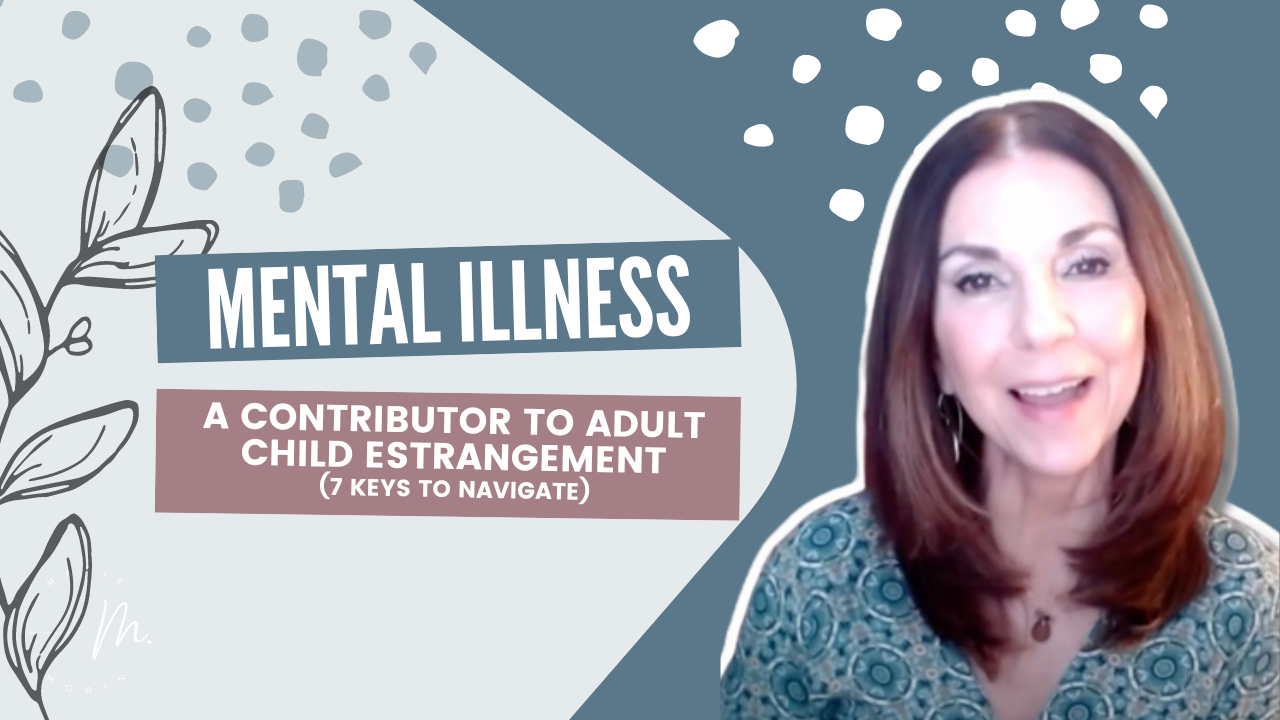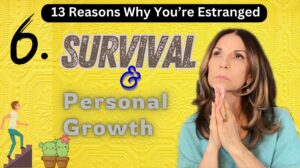It is difficult to see someone we love suffer; the pain can be exceptionally sharp when that someone is our child. When our child is estranged and also suffers from a mental illness, the worry and layers of emotions make it all the more difficult for the parent.
Of course, the adult child or anyone who struggles with symptoms that affect their functioning, state of mind, and distress level deserves compassion; it is undoubtedly challenging and not something anyone chooses to endure. This article discusses Adult Child Estrangement and Mental illness and Seven Keys To Manage Cut-Off.
What Is Mental Illness?
Mental illness can impact an individual’s thoughts, emotions, and behavior. It can also affect an individual’s ability to relate to others, cope with stress, and make decisions. Mental illness is not a single disorder but rather a group of disorders that can have different symptoms and levels of severity.
According to the National Institute of Mental Health, more than 50% of people in the United States will be diagnosed with a mental illness or disorder at some point in their lifetime. Mental illness is a severe problem that can impact every area of a person’s life, from personal relationships to professional achievements.
Definitions of mental disorders in the DSM-5 consider these five factors:
- A behavioral or psychological syndrome or pattern occurs in an individual.
- Reflects an underlying psychobiological dysfunction
- The consequences are clinically significant distress (e.g., a painful symptom) or disability (i.e., impairment in one or more critical areas of functioning) like going to work, school, and taking care of oneself.
- It must not be merely an expected response to everyday stressors and losses (ex., the loss of a loved one) or a culturally sanctioned response to a particular event (ex., trance states in religious rituals)
- Primarily a result of social deviance or conflicts with society
Sadly, mental illness faces an enormous stigma: a mark of disgrace associated with a particular circumstance, quality, or person. A lack of understanding and knowledge about mental illness perpetuates mental health stigma. It can be difficult for people to see past the stereotypes and myths of the reality of mental illness. Even people who have mental illness can buy into the stigma. This internalized stigma can be as harmful as external stigma, leading to shame, self-blame, and isolation.
Parents With Mental Illness
It is common for mental illness to become a significant factor in the parent-child relationship and cause estrangement. In some cases, the parent’s mental illness can become so severe that it is no longer safe for the adult child to resume contact with them.
Disturbances in functioning levels, such as the ability to take care of children, one’s belongings, cleanliness, work, and socializing, become evident with a parent with mental illness.
Severe illnesses, such as personality disorders, bipolar, and depression, can cause a parent to behave in ways that could push the adult child away. The adult child may lose trust in the parent’s ability to engage in a fulfilling and mutual relationship. Severe mental illness can contribute to abuse in the home towards the child and could cause damage to the relationship.
Adult Children With Mental Illness
Mental illness can take a toll on relationships; nowhere is this more apparent than between parents and their adult children. A strain on the connection is expected when mental illness is involved. However, there are ways to work through this strain and improve communication. It’s important to understand that mental illness can cause changes in behavior that may be difficult to understand.
For example, an adult child with mental illness may withdraw from their parents or be unable to keep up with communication. They may also act out in ways that are hurtful or confusing. As a result, it’s essential to have patience and to try to see the situation from your child’s perspective.
Parents naturally become apprehensive about their unstable adult child’s decisions and might take on a “hovering” behavior because they are so concerned with what their adult child might do next. Hovering behavior can create discomfort for the adult child and cause them to disengage or become irritable.
On the other hand, the adult child’s conduct may be so concerning that the parent feels stuck and does not know what to do or say. The uncertainty can lead to miscommunications and further disrupt the adult child’s fragile state.
Who is To Blame?
The causes of mental illness are vast and can include early childhood trauma such as abuse or witnessing violence. Other factors include genetic predisposition, ongoing chronic illness, biological factors, or chemical imbalances. Mental illness sometimes does not rear its head until the late teenage years or well into the individual’s twenties. Some parents have been neglectful, abusive, and selfish; however, not every parent falls into this category.
Some adult children blame the illness on their parents’ failure to attend to symptoms sooner. If the mental illness runs in the family, or there was childhood trauma perpetrated by someone other than siblings or family, the adult child may blame the parent for failing to protect the adult child.
As a result of this parental failure, the adult child perceives their parent as responsible for their mental distress. There could have been no apparent signs of abuse or mental illness in the formative years, in which case the parent couldn’t have done anything to decrease the likelihood of struggles down the line. This circumstance creates a complicated foundation for estrangement and is heartbreaking for both parties when trust and connection become lost. Research is clear that there are many contributors to estrangement.
What’s A Parent To Do?
Sometimes it might feel like there is no way to accommodate an adult child with a mental illness. The relationship is not healthy enough for both parent and adult child to exist with all their personality nuances and flaws.
Often when the dynamic within a family is an enmeshed arrangement where one person feels responsible for caring for another, and there is codependency, there is a lack of boundaries. Individuals tend to run themselves into the ground, worrying and hoping to find something to help their loved ones.
Seven Keys To Navigate Estrangement And Mental Illness:
With estrangement and its entanglement with mental illness, your adult child may very well be in and out of communication with you. It’s necessary to have skills to prepare for when the relationship may resume.
- Decide to create a boundary that says your well-being and safety matter.
- Be informed about the individual’s mental illness so you understand that it impacts them to such a degree that they can’t just snap out of it.
- Be ready to set a boundary around what you will not accept in their presence. If your adult child’s symptoms bring explosive angry behaviors towards you, you should have a boundary in place..
- Commit to boundaries of how you will aim to support your adult child, including not putting yourself in harm’s way.
- Learn communication skills so you can clearly and calmly tell your adult child what is and what is not acceptable.
- Stick to your boundaries by getting support from a coach, therapist, or NAMI (The National Alliance On Mental Alliance).
- Let your adult child know you love them and validate their experience. They need to know you understand it is extremely hard for them.
Even with these resources for handling your adult child struggling with mental illness, sometimes the relationship is impossible because they are in such emotional turmoil. They fear closeness and cannot deal with the usual ups and downs of relationships because of the intensity of their inner state.
Conclusion
As the parent of an estranged child with a mental illness, you may feel lost, confused, and overwhelmed. You are not alone. Many parents find themselves in this situation and struggle to cope with the challenges it brings. While showing your child compassion is necessary, taking care of yourself is equally vital. Finding a support system and understanding your options and how to move forward is crucial. This article discusses Adult Child Estrangement and Mental illness and Seven Keys To Manage Cut-Off.






